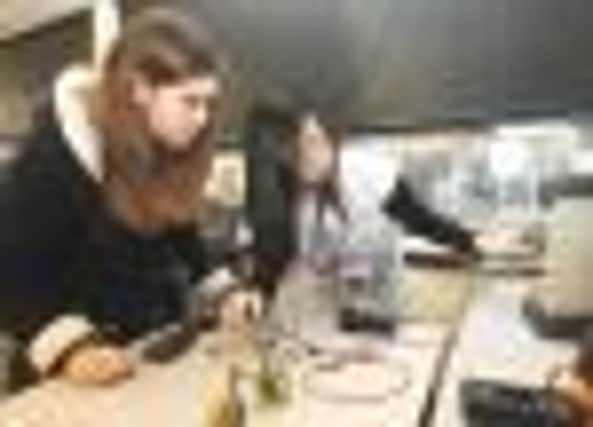Pupils blast off on mission to Mars


On 23rd and 24th January 2013, all Year 12 International Baccalaureate students were involved in a science project that accounted for 3% of their science grade. Whilst the next Rover to the Red Planet is not planned until 2020, they had just 2 days to research, test and present their proposal to a panel of in-house scientists.
‘Getting to Mars’ was the mission chosen by Steyning Grammar School for the IB Group 4 science project , to test personal skills, motivation, perseverance, team work & self-reflection and evaluate how they manifest themselves in the students.
Advertisement
Hide AdAdvertisement
Hide AdThe group of 24 was split into 5 teams, each consisting of at least one chemist, one physicist and one biologist, and given a topic to investigate. The teams went their separate ways, each to focus on their individual Mars mission and develop theories for food and water supplies, keeping fit and healthy, avoiding psychological imbalance and providing protection against harmful radiation.
After a morning of lab tests using computerised measurements to measure temperature, light, sound, Voltage, electric current and magnetism, students conducted research on the Internet and in scientific journals on-site, at the Learning Resource Centre. The second morning was spent developing presentations, putting forward ideas and analysing data to allow detailed conclusions driven by scientific evidence.
How do you prepare for a mission to Mars? The outward journey could take anything between 1 and 4 years (depending on the speed and amount of fuel you could take).
Several months would be spent on site to gather samples and the return voyage would take at least another year. Preparing for such a trip means planning enough food, fuel and water for the whole duration as these will not be readily available at destination.
Advertisement
Hide AdAdvertisement
Hide AdThere are other issues, too. Keeping fit and avoiding muscle wastage is a challenge when there is less resistance to body movements due to reductions in the strength of gravity. What level and form of exercise would be required to maintain healthy body tissues?
Psychological balance could suffer tremendously. How do you keep sane, avoid cabin fever, cope with confined spaces and get on with your fellow travellers with perhaps very limited contacts with Earth?
Air supplies and harmful radiation are also problematic. Are the human lungs harmed without natural air for such a long period of time? Is the radiation protection safe enough in the spacecraft to ensure you won’t suffer from terminal diseases years after your mission is over? ( If you make it back, that is.)
The students took their task very seriously with the’ water’ team conducting their own tests to evaluate the possibility of recycling water wastage from their body using osmosis and the ‘psychology’ group locking themselves in a broom cupboard for over 4 hours to measure their levels of stress.
Advertisement
Hide AdAdvertisement
Hide AdEach team produced a very well researched presentation with ideas such as; ‘Grow Your Own on Mars’ from the ‘food’ team, ‘Remote Controlled Field Robots to Gather Samples and Avoid Radioactive Exposure on Mars’ for the ‘radiation’ group and the use of a Fly Wheel asthe Ultimate Space Training Machine from the ‘exercise’ party.
Danielle Cook, IB Coordinator at Steyning Grammar School, was very impressed with everyone: ‘We were all pleased to see such earnestness in young adults. Each individual immersed themselves in the topic given and the groups worked well together as teams, persevering in their research until they were confident they knew their subjects well enough to make tentative conclusions, both important aspects of the IB profile. ‘
Of all the participants, just one said he would be willing to undertake a real mission in space, for the adventure, but not to Mars. ‘Mars is still to a large extent unknown’, they agreed.